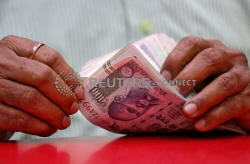|
Within stressed corporate assets of 13.5 trillion rupees to 14
trillion rupees in Indian banks, about 3.5 trillion rupees are
unrecognized by lenders. This highlighted the fact that these
loans are still being serviced by borrowers, and categorized as
"standard" on banks' books, said India Ratings & Research, while
publishing a report on banking sector outlook.
"In worst-case scenario, about half of the unrecognized stressed
assets can slip into NPAs (non performing assets) in two years
from October 2018," said Jindal Haria, associate director of
banking and financial institutions, India Ratings & Research.
The Indian banking sector has been under massive stress in the
last few years as lenders have struggled with about $150 billion
of bad loans that have constrained their lending ability, and in
turn, hit economic revival.
"The probability of such accounts with interest coverage ratio
of less than 1.5 times of becoming NPA is high, but technically
they are still standard assets on banks' books," said Haria, in
reference to companies' debt-servicing ability.
Despite the new provisioning, Haria remained confident that
stress recognition around corporate accounts has almost peaked
and the banking cycle will rebound.
"Many public sector banks will materially turn to profitability
in 2019/20 and lending will improve," Haria added.
That could be a relief for Prime Minister Narendra Modi, who is
keen to boost credit availability to businesses, as he aims to
please companies and rural voters ahead of general elections due
in May.
Even as Modi aims to woo voters, the Reserve Bank of India will
announce its monetary policy on Thursday where it is likely to
shift its stance to "neutral" from "calibrated tightening", and
move closer to a rate cut by April as inflation stays below the
central bank's 4 percent target.
(Reporting by Suvashree Dey Choudhury, Editing by Sherry
Jacob-Phillips)
[© 2019 Thomson Reuters. All rights
reserved.] Copyright 2019 Reuters. All rights reserved. This material may not be published,
broadcast, rewritten or redistributed.
Thompson Reuters is solely responsible for this content.

|
|





